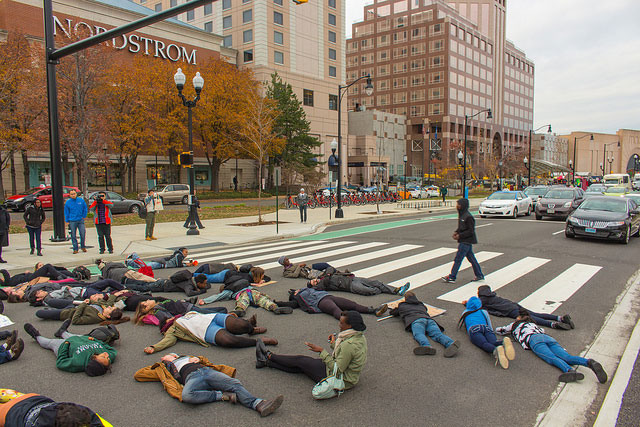
An Arizona bill that sought to prosecute protest organizers like racketeers is officially dead after widespread outcry forced state lawmakers to put that effort to rest, marking a victory for the national resistance movement currently facing a rash of legislation aimed at stifling dissent.
Arizona House Speaker J.D. Mesnard announced late Monday that the bill, SB 1142, would not move forward in the legislature.
“I haven’t studied the issue or the bill itself, but the simple reality is that it created a lot of consternation about what the bill was trying to do,” Mesnard, a Republican, told the Phoenix New Times. “People believed it was going to infringe on really fundamental rights. The best way to deal with that was to put it to bed.”
Indeed, the legislation, which would have expanded state racketeering laws to allow police to arrest and seize the assets of suspected protest organizers, made national headlines last week after passing the GOP-led Senate.
However, according to The Arizona Republic, the bill’s “fate was sealed over the weekend” as Mesnard “fielded phone calls from the public to complain about the bill. The House leader’s personal cellphone number is listed on his personal website. As he listened to the callers, Mesnard realized their belief that the legislation was intended to curb free-speech rights outweighed any merits its supporters might put forward. He carefully read the legislation and by the time he returned Monday to his office, where there were more than 100 messages about the bill awaiting him, he decided he would kill the measure.”
The so-called “Plan a Protest, Lose Your House Bill” was the most recent state-level attempt to crackdown on the growing protest movement and opponents celebrated its defeat.
“Thanks to everyone who spoke out against this terrible proposal!” the ACLU of Arizona wrote on Twitter. “Continue fighting for our civil liberties!”
A recent analysis by the Washington Post found that “Republican lawmakers in at least 18 states have introduced on voted on legislation to curb mass protests,” which includes bills that would “increase punishments for blocking highways, ban the use of masks during protests, [and] indemnify drivers who strike protesters with their cars.”
As Common Dreams has previously observed, most of these anti-protest bills have sprouted up in Republican-dominated states that have seen a flurry of demonstrations and civil disobedience.
In Minnesota, where people protested the police killings of Philando Castile and Jamar Clark by blocking roads, measures aimed at raising the penalties for obstructing traffic are gaining traction. Numerous bills were approved by public safety committees in both the House and Senate last week, despite vocal opposition.
Running down some of the other pending legislative efforts, The Atlantic’s Matt Ford wrote Tuesday:
Tennessee lawmakers introduced their own civil-liability bill in February. […]
Iowa’s Senate File 111 would make blocking highways a felony offense with a possible five-year prison sentence.
In Washington, a version of the highway-protest bills came in response to environmentalist-led demonstrations that had targeted the oil industry. State Senator Doug Ericksen introduced Senate Bill 5009, also titled the Preventing Economic Disruption Act. It allows prosecutors to seek longer sentences against defendants who commit crimes that cause “economic disruption,” which it defines as obstructing commercial vehicles or interfering with pipelines or oil-related facilities.
Meanwhile, public opposition has already defeated numerous other attempts, such as North Dakota’s “civil liability” bill, a Virginia effort that would have brought potential jail time for attending a protest, and now Arizona’s SB 1142.
As Lee Rowland, a senior attorney with the American Civil Liberties Union, explained to the Post, the new bills are “not about creating new rules that are necessary because of some gap in the law.” Rather, Rowland said, the intent is to “increas[e] the penalties for protest-related activity to the point that it results in self-censorship among protesters who have every intention to obey the law.”
The laws as well as the impulse to label protesters as “paid” or “professional” agitators are simply “standard operating procedure for movement opponents,” according to Douglas McAdam, a Stanford sociology professor who studies protest movements.
“For instance, southern legislatures — especially in the Deep South — responded to the Montgomery Bus Boycott (and the Supreme Court’s decision in Brown v. Board of Education) with dozens and dozens of new bills outlawing civil rights groups, limiting the rights of assembly, etc. all in an effort to make civil rights organizing more difficult,” he wrote in an email to the Post. “Similarly, laws designed to limit or outlaw labor organizing or limit labor rights were common in the late 19th/early 20th century.”
The Atlantic’s Ford also concluded that “[t]he proposals as a whole point to a more enduring dynamic: As mass protests return to the political zeitgeist, so too will efforts to clamp down on them.”
Join us in defending the truth before it’s too late
The future of independent journalism is uncertain, and the consequences of losing it are too grave to ignore. To ensure Truthout remains safe, strong, and free, we need to raise $27,000 in the next 24 hours. Every dollar raised goes directly toward the costs of producing news you can trust.
Please give what you can — because by supporting us with a tax-deductible donation, you’re not just preserving a source of news, you’re helping to safeguard what’s left of our democracy.